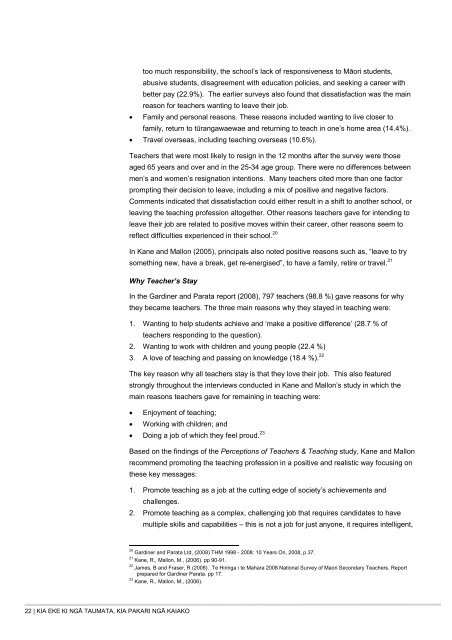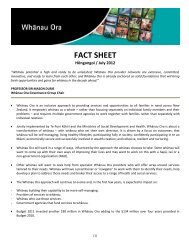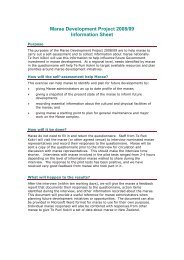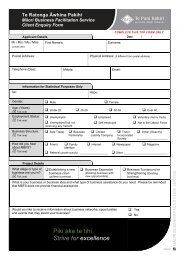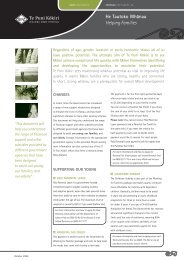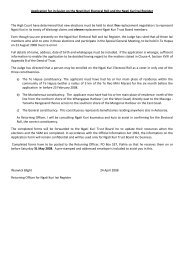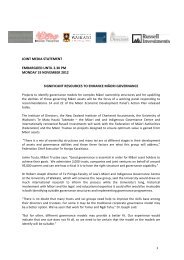Kia eke ki ngÄ Taumata, kia Pakari ngÄ Kaiako He ... - Te Puni Kokiri
Kia eke ki ngÄ Taumata, kia Pakari ngÄ Kaiako He ... - Te Puni Kokiri
Kia eke ki ngÄ Taumata, kia Pakari ngÄ Kaiako He ... - Te Puni Kokiri
You also want an ePaper? Increase the reach of your titles
YUMPU automatically turns print PDFs into web optimized ePapers that Google loves.
too much responsibility, the school’s lack of responsiveness to Māori students,abusive students, disagreement with education policies, and see<strong>ki</strong>ng a career withbetter pay (22.9%). The earlier surveys also found that dissatisfaction was the mainreason for teachers wanting to leave their job.• Family and personal reasons. These reasons included wanting to live closer tofamily, return to tūrangawaewae and returning to teach in one’s home area (14.4%).• Travel overseas, including teaching overseas (10.6%).<strong>Te</strong>achers that were most likely to resign in the 12 months after the survey were thoseaged 65 years and over and in the 25-34 age group. There were no differences betweenmen’s and women’s resignation intentions. Many teachers cited more than one factorprompting their decision to leave, including a mix of positive and negative factors.Comments indicated that dissatisfaction could either result in a shift to another school, orleaving the teaching profession altogether. Other reasons teachers gave for intending toleave their job are related to positive moves within their career, other reasons seem toreflect difficulties experienced in their school. 20In Kane and Mallon (2005), principals also noted positive reasons such as, “leave to trysomething new, have a break, get re-energised”, to have a family, retire or travel. 21Why <strong>Te</strong>acher’s StayIn the Gardiner and Parata report (2008), 797 teachers (98.8 %) gave reasons for whythey became teachers. The three main reasons why they stayed in teaching were:1. Wanting to help students achieve and ‘make a positive difference’ (28.7 % ofteachers responding to the question).2. Wanting to work with children and young people (22.4 %)3. A love of teaching and passing on knowledge (18.4 %). 22The key reason why all teachers stay is that they love their job. This also featuredstrongly throughout the interviews conducted in Kane and Mallon’s study in which themain reasons teachers gave for remaining in teaching were:• Enjoyment of teaching;• Wor<strong>ki</strong>ng with children; and• Doing a job of which they feel proud. 23Based on the findings of the Perceptions of <strong>Te</strong>achers & <strong>Te</strong>aching study, Kane and Mallonrecommend promoting the teaching profession in a positive and realistic way focusing onthese key messages:1. Promote teaching as a job at the cutting edge of society’s achievements andchallenges.2. Promote teaching as a complex, challenging job that requires candidates to havemultiple s<strong>ki</strong>lls and capabilities – this is not a job for just anyone, it requires intelligent,20 Gardiner and Parata Ltd, (2008) THM 1998 - 2008: 10 Years On, 2008, p 37.21 Kane, R., Mallon, M., (2006). pp 90-91.22 James, B and Fraser, R (2008). <strong>Te</strong> Hiringa i te Mahara 2008 National Survey of Maori Secondary <strong>Te</strong>achers. Reportprepared for Gardiner Parata. pp 17.23 Kane, R., Mallon, M., (2006).22 | KIA EKE KI NGĀ TAUMATA, KIA PAKARI NGĀ KAIAKO


